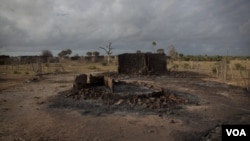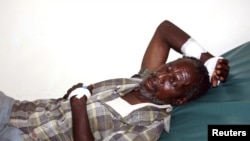KILELENGWANI, KENYA —
Thousands have fled violence that claimed more than 100 lives in August and September in Kenya’s Tana River District. One-thousand paramilitary troops have been deployed to keep a tenuous peace between the Pokomo and Orma communities.
Today in Kilelengwani, Marabou storks circle the carcasses of cows scattered between the remains of still-smoldering homes.
On September 11, a few hundred Pokomo men wielding guns, machetes and spears attacked the village in Kenya’s Tana River District, killing 38 people. Nine of the victims were police officers sent to protect the village. Most others were Orma women and children.
In Nairobi, Hussein Dado, a candidate running for governor of Tana River County, received a call from his niece the morning of the massacre.
"I have never been traumatized the way I was traumatized by a call from a woman who ran for safety into the mosque. She is a niece. She called me on the phone and said, ‘Uncle we are being killed, please save us.’ I could hear children crying," said Dado.
A village elder in Kilelengwani, Omar Shure, also was inside the mosque. He threw himself against the door, keeping the militia outside the main room. But attackers broke into an adjacent prayer room where several people were hiding.
“They left them, just there, after killing," said Shure. "In the room... two children, five women.”
The massacre at Kilelengwani followed a string of attacks between the agriculturalist Pokomo and pastoralist Orma communities. Historically, tensions flare between the two during dry season, when Orma bring their cattle to graze on Pokomo land.
Thousands of Pokomos and Ormas have fled their villages fearing retaliatory attacks. Pokomo elder Suleiman Ludu is staying in an internally displaced persons camp in the town of Witu.
"The Ormas, they come to the shambas [farms] and they graze on our plants, and if we refuse, they say, 'if you do not want us to graze here we will beat you and kill you.' So it is better we run instead of waiting to be killed," said Ludu.
International Crisis Group Kenya analyst Abdullahi Halakhe described the conflicting livelihoods of Tana River.
"How can we negotiate this reality? Some argue pastoralism is good for the area, in terms of economic activity, and it gives time for grass and other natural resources to regenerate. Others are dead set on saying that pastoralists should move away from their nomadic livelihoods and turn to agriculture," said Halakhe.
Though people on both sides have been killed, the majority of victims during the most recent violence have been Orma pastoralists. Survivors describe an organized Pokomo militia, wearing red and black uniforms and having a clear command structure.
"They are after this delta, it is the only good delta in Kenya, the only big delta in Kenya," said Omar Bacha, an Orma health worker. "That is why our tribe are being killed, and their cows are being destroyed."
The Tana River region contains some of the nation’s most arable, but least developed land. Through the process of devolution outlined in Kenya’s new constitution, local administrators soon will have more control over regional resources.
A Human Rights Watch report released last week implicates Tana River politicians in the attacks. Last week the government arrested parliament-member Dhadho Godhana in connection with the violence. Godhana is running for governor of Tana River Country in the elections scheduled for next March.
In addition to Godhana’s arrest and continuing investigations into the violence, the government has deployed 1,000 paramilitaries to secure the region. Despite these measures, both Pokomo and Orma have been slow to return home.
Today in Kilelengwani, Marabou storks circle the carcasses of cows scattered between the remains of still-smoldering homes.
On September 11, a few hundred Pokomo men wielding guns, machetes and spears attacked the village in Kenya’s Tana River District, killing 38 people. Nine of the victims were police officers sent to protect the village. Most others were Orma women and children.
In Nairobi, Hussein Dado, a candidate running for governor of Tana River County, received a call from his niece the morning of the massacre.
"I have never been traumatized the way I was traumatized by a call from a woman who ran for safety into the mosque. She is a niece. She called me on the phone and said, ‘Uncle we are being killed, please save us.’ I could hear children crying," said Dado.
A village elder in Kilelengwani, Omar Shure, also was inside the mosque. He threw himself against the door, keeping the militia outside the main room. But attackers broke into an adjacent prayer room where several people were hiding.
“They left them, just there, after killing," said Shure. "In the room... two children, five women.”
The massacre at Kilelengwani followed a string of attacks between the agriculturalist Pokomo and pastoralist Orma communities. Historically, tensions flare between the two during dry season, when Orma bring their cattle to graze on Pokomo land.
Thousands of Pokomos and Ormas have fled their villages fearing retaliatory attacks. Pokomo elder Suleiman Ludu is staying in an internally displaced persons camp in the town of Witu.
"The Ormas, they come to the shambas [farms] and they graze on our plants, and if we refuse, they say, 'if you do not want us to graze here we will beat you and kill you.' So it is better we run instead of waiting to be killed," said Ludu.
International Crisis Group Kenya analyst Abdullahi Halakhe described the conflicting livelihoods of Tana River.
"How can we negotiate this reality? Some argue pastoralism is good for the area, in terms of economic activity, and it gives time for grass and other natural resources to regenerate. Others are dead set on saying that pastoralists should move away from their nomadic livelihoods and turn to agriculture," said Halakhe.
Though people on both sides have been killed, the majority of victims during the most recent violence have been Orma pastoralists. Survivors describe an organized Pokomo militia, wearing red and black uniforms and having a clear command structure.
"They are after this delta, it is the only good delta in Kenya, the only big delta in Kenya," said Omar Bacha, an Orma health worker. "That is why our tribe are being killed, and their cows are being destroyed."
The Tana River region contains some of the nation’s most arable, but least developed land. Through the process of devolution outlined in Kenya’s new constitution, local administrators soon will have more control over regional resources.
A Human Rights Watch report released last week implicates Tana River politicians in the attacks. Last week the government arrested parliament-member Dhadho Godhana in connection with the violence. Godhana is running for governor of Tana River Country in the elections scheduled for next March.
In addition to Godhana’s arrest and continuing investigations into the violence, the government has deployed 1,000 paramilitaries to secure the region. Despite these measures, both Pokomo and Orma have been slow to return home.





